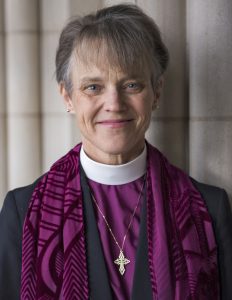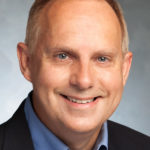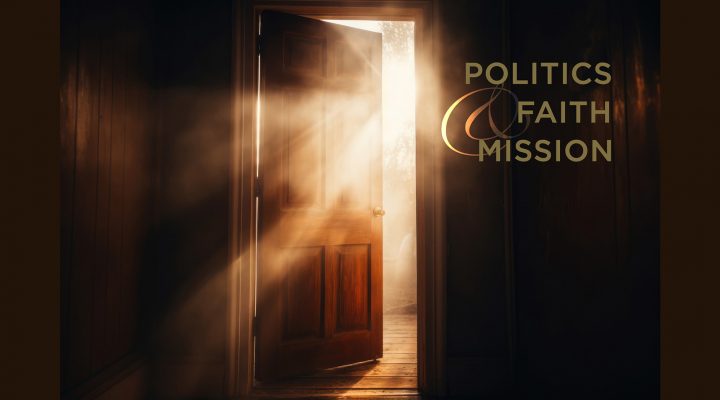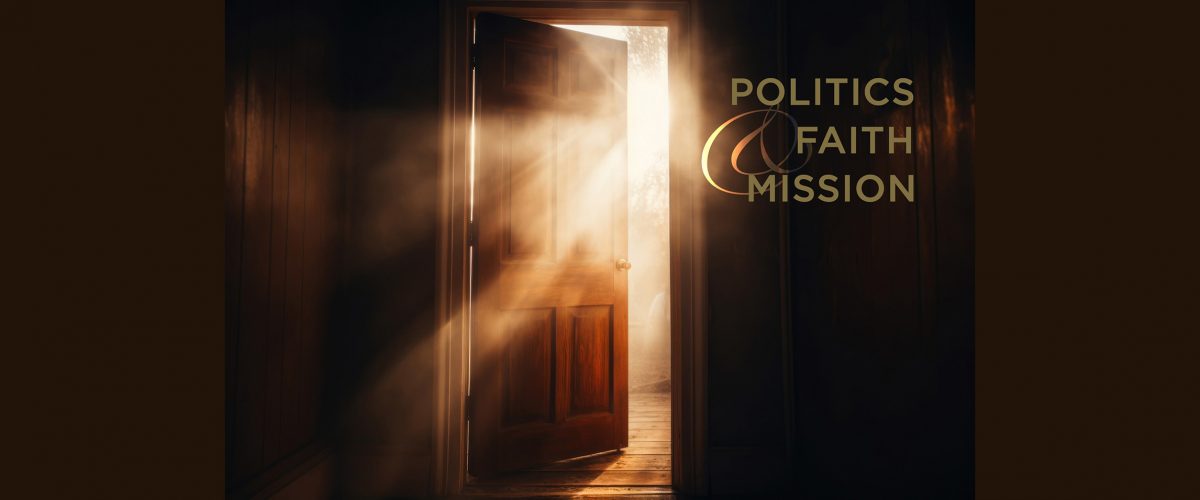Bishop Mariann Edgar Budde has been the Episcopal bishop of Washington, D.C., since 2011. She has discussed faith and politics on PBS NewsHour, Meet the Press, Good Morning America, and the Today show, and is the author of several books, most recently How We Learn to Be Brave: Decisive Moments in Life and Faith. I am grateful to Bishop Budde for an in-depth conversation — edited here for brevity and clarity — about how she sees the intersections of faith and politics in her life and work. I hope this will speak to you this Holy Week.

Mariann Edgar Budde
Greg Garrett: Bishop, I recall seeing you on the airwaves in June 2020 when former president Trump cleared peaceful protesters out of Lafayette Square so he could pose in front of St. John’s Episcopal Church with someone’s Bible. You told Anderson Cooper you were outraged that Trump had used the Bible, our most sacred text, for messaging that was “antithetical to everything that our church stands for.” In a world filled with what feels like daily outrages, how and when is it important to offer your teaching and leadership in response to political events or discourse?
Mariann Budde: Well, as someone wisely said during that era, if we spoke out against every offensive statement, that would be our full-time job. That was a judgment call.
The reason I felt compelled to speak is that things had been building for me for some time. That was the season where you could barely turn on the news without there being some other Black man or woman or child being shot or abused by police officers. And then the George Floyd murder occurred in Minneapolis, where I lived for 18 years, where I raised my kids.
I can’t remember what the day was when Trump did his thing. But I was at home with my mom watching the news and my phone just started ringing off the hook. And someone in my world said to me, “People need to hear from you tonight.” I knew they were right because it wasn’t just the offenses of the hour. He was using our church as a backdrop. He was holding our sacred text and using it as a mantle of authority to communicate a level of inflammation, making things worse rather than being a voice of calm. If he had said, “Look, I want to come over and offer a prayer, I want to come over and pray in the building,” any of those things, obviously we would’ve welcomed him with open arms.
“He was using our church as a backdrop.”
The only thing that made it a news story is that I happened to catch a couple of journalists at the moment and they shed a light on it, and it became part of the news cycle for about four days. At the time I thought, OK, this was an important moment, but what really matters is how we stay in the struggle for the long term. News cycles come and go, the cameras come and go. I try to keep my eye on that and not get too overly impressed when there’s a lot of public support for things like that, and conversely, when there’s a lot of criticism.
GG: You are bishop to a historic diocese — nine of your churches go back to the 1600s — encompassing the National Cathedral, 10 Episcopal schools and 86 churches in the District of Columbia and Maryland. It makes me wonder, thinking about that response and about the long term, what does it mean to be bishop in Washington, D.C.? What are some of the ways that your diocese leans into being the church in D.C.?
MB: The majority of my work as bishop, to be honest, is to help Episcopal congregations try to adapt and thrive in an unfamiliar landscape. So I’m mostly a leader trying to support congregations, raise up new clergy, deal with crises, all of that, and then think about who we are in public discourse, public ministry, the common good. The things I’m most proud of are when our congregations themselves lean into their mission to be beacons of Jesus’ love in the world. Some of them, like St. Mark’s, Capitol Hill, right next to the Capitol, are a beacon of hospitality. It doesn’t matter which group, they are open to all to be a place people can use as a stopping place, a place of hospitality while they are lobbying and that whole thing. I love that about St. Mark’s.
I love when our churches are reaching people and speaking from their lived experience. So when we speak about immigration, we’re talking from the experience of immigrants. When we’re speaking of LGBTQ and trans inclusion, we are congregations that have been walking that path with people since forever, taking the hard knocks from all that as we go and also the joys. When we deal with issues of gun violence prevention, we are not just talking about the issue abstractly, we’re actually saying, “Hey, here are the ways gun violence is affecting our neighborhoods and our communities.”
GG: My third question grows out of the stage managing of the Bible in front of St. John’s. When I was looking back through some of the media around that 2020 event, I ran across a person I’m very familiar with now, the scholar Andrew Whitehead, who writes about Christian nationalism. The Post had quoted him saying that basically what Trump was doing was appealing to a certain kind of Christianity, if you want to call it that. I wonder, what are some things that we can do to speak out against, to draw attention to the labeling of something as Christian nationalism when there’s nothing particularly Christian about it?
“There are people who are saying and doing things that have nothing to do with Jesus in Jesus’ name.”
MB: I say this with some degree of humility and also of horror: There are people who are saying and doing things that have nothing to do with Jesus in Jesus’ name. So that just has to be said. And there are people who, for example, support (Donald Trump) in his run for reelection thinking it is a Christian thing to do. I think they could not be more misguided, but they also have come to accept their compromises about that, the way I do when I support a candidate who isn’t the manifestation of my complete alignment of values.
I don’t know that you can make really strong, strident statements about how awful this is, how it needs to be called out, there are other ways to be Christian. There’s another kind of discourse which is more in the middle of relationships where people might be able to have real conversations.
I have to credit my friend Doug Paget, who’s dedicated his life to this, to spending time in Christian nationalist circles and with other Christians who feel like they have no alternative, who have been told all their lives that the only thing they can do is support the Republican Party. And he’s not saying to never support the Republican Party, but it wouldn’t be a sin if you chose not to support the Republican Party. And here are some people in the Republican Party who are actually quite dangerous. He’s saying, “We need to have a conversation about this,” and he’s trying to reach people who could actually engage in conversation.
There are some people that I don’t know that we can engage them, because we’re not moving toward each other. You can only talk to people who are moving toward each other.
And then we have to talk to the people who imagine that this is all Christianity is. And to be honest, we’re not as compelling a witness as we might be because our numbers are so small, and our institutions are pretty weak. One of the things I’m trying to do is to build a stronger church where more people can have an experience that I think you and I value of being in a church where you can really talk about these things and be in thoughtful, reflective conversation about the implications of our faith that’s aligned with Jesus.
And one thing: as presiding Bishop (Michael) Curry says, the more you talk about Jesus, the less Christian Christian nationalism becomes.
“The more you talk about Jesus, the less Christian Christian nationalism becomes.”
GG: Well, let me ask you about the Cathedral Day sermon you preached last September at Washington National Cathedral. I mentioned to you after the service that it was such a fine sermon on race and racial repair. You talked about your journey, you talked about the cathedral’s journey, things that are so powerful and so helpful particularly in helping people who look like us think about how a journey toward racial repair might look.
MB: Well, it was a sermon on foundations, because it was preached on Cathedral Day, which is the day when we celebrate the laying of the first cornerstone of the Cathedral. It was also the weekend, as you know, we were celebrating the installation of the Now and Forever windows that are trying to bring the experience of Black Americans and Black Americans’ protests for freedom into the national story. So there was a lot to celebrate on that day.
I needed to reflect on how you build strong foundations, and what happens when you realize that some of the foundations you’ve built are faulty and cannot hold. We incorporate things into our identities that we realize are not helpful to us any longer, and so we need to change them or go back and undo them.
I just tried to be as broad as I could. And then to say, “As we look at this cathedral’s history, we must acknowledge that the original windows that were placed there, the Confederate windows, were placed at a time when the church was being built and when there was a concerted movement in this country to glorify the Southern heroes and to silence and even to erase the contributions of Black Americans.”
All those things were embedded in our architecture through the bay and the windows, and we had to acknowledge that. I had to say, and maybe this is why you said it was helpful for us as white people, I had to say, I didn’t know they were there. I didn’t know we had those windows until the Charlottesville riots. I just had no idea.
But of course, the Black people knew they were there. The Black clergy in the diocese knew they were there. They saw them as they walked by them every day, right? It was an eye-opening moment to say, “This causes real pain and harm. They do not belong in this cathedral. They were not put there for benign reasons.”
We needed not only to take them out, but to acknowledge that’s part of who we are and to apologize and to make it right.
“Part of the problem of our country is that we just don’t know.”
I felt it was the perfect opportunity and privilege to do that work and also to acknowledge my own ignorance, born of white privilege. Part of the problem of our country is that we just don’t know. And we don’t know because it was in someone’s interest, including our own, for that story to be suppressed.
GG: I’m going to ask you to be my bishop for this last question. When I introduce myself, sometimes I say, “I write about all the things that we’re not supposed to talk about at the dinner table.” So that means my days are kind of stressful and difficult. I consume way too much news. I’m wondering, first, if you could talk me and people like me down from our trees where we are terrified about futures that haven’t happened yet, and then I’m also wondering, either in your personal or professional life, where are you finding peace and joy and comfort in the present moment?
MB: I get in that tree myself, right? I’m not made of stone. We don’t want to minimize the issues that are before us and are before our children and our grandchildren and people around the world. And the fact that we can have this conversation in the abstract rather than in real time just says how lucky we are, me to be sitting in my kitchen, you in your office.
The concerns are real. Hope and faith are choices we make to live by the possibility that good is something to long for and to hope for and to work toward, and we can put ourselves on that side, on the side of life, even if we do not succeed. And we might not, but wouldn’t we rather live in hope than succumb to fear and cynicism, which is a far easier path? It takes no energy whatsoever to be anxious or negative or a cynic; it’s as easy as breathing. It takes effort to persist in hope and love and faith. Those are disciplines.
“I’m going to live my life in the realm of hope, if not for myself, then for the people coming up behind me.”
I have been deeply informed of late by something Nadia Bolz-Weber wrote about in a book titled When Time is Short, about the possibility of the end of the human species. This person (Timothy Beal) who’s writing is a theologian. He’s like, “Well, then, how do we live? How do you live if you knew this is true?” I’ve been taking the question very seriously and Nadia did as well. But if it’s true, then we move into the kind of questions you ask near the end of your own life like, “What is most important? How can I love, how can I care for people? What is the best that I can do?” And she said if we live like that, we may have a greater chance of turning things around.
It was one of those great moments. I don’t know if any of that’s true, but I’m going to live my life in the realm of hope, if not for myself, then for the people coming up behind me. Because the last thing people need from those of us in our generation is to just be whining and pessimistic. That’s the last thing they need from us. Or to just say stupid things like, “Well, we sure messed things up. We hope you’re going to fix it.”
To find hope, my wells need to be replenished, so I need to spend time in beauty. I need to spend time with children. I need to spend time reflecting on the wisdom of people who lived or are living now in much harder times than I and still are able to find joy and love.
I am flawed. I am aware of all the things that will make my desires for impact be muted by reality. And at the same time, we don’t get a pass. What did Gandalf say to Frodo? “It’s not the times you live in, it’s how you choose to live in the times you’re given.” So here we are.

Greg Garrett
Greg Garrett teaches creative writing, film, literature and theology classes at Baylor University. He is the author of two dozen books of fiction, nonfiction, memoir and translation, including the critically acclaimed novels Free Bird, Cycling, Shame and The Prodigal. His latest novel is Bastille Day. He is one of America’s leading voices on religion and culture. Two of his recent nonfiction books are In Conversation: Rowan Williams and Greg Garrett and A Long, Long Way: Hollywood’s Unfinished Journey from Racism to Reconciliation. He is a seminary-trained lay preacher in the Episcopal Church. He lives in Austin with his wife, Jeanie, and their two daughters.
More from this series:
Politics, faith and mission: A conversation with Vann Newkirk II
Politics, faith and mission: A conversation with Sarah McCammon
Politics, faith and mission: A conversation with Winnie Varghese
Politics, faith and mission: A conversation with Kaitlyn Schiess
Politics, faith and mission: A conversation with Russell Moore
Politics, faith and mission: A BNG interview series on the 2024 election and the Church
Politics, faith and mission: A talk with Tim Alberta on his book and faith journey
Politics, faith and mission: A conversation with Jemar Tisby
Politics, faith and mission: A conversation with Leonard Hamlin Sr.
Politics, faith and mission: A conversation with Ty Seidule
Politics, faith and mission: A conversation with Jessica Wai-Fong Wong


